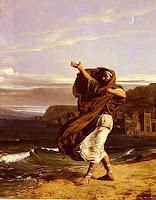As you can tell, I am cheating a bit in beginning this reading project by going through authors that do not have a large catalog. There are two poems attributed to
Servasius (or Serbastus as he is called in the codex Leidensis Vossianus of Ausonius). The second is a diatribe against greed in elegiac couplets with echoes of Juvenal. Three couplets caught my eye:
First, I could not help but thing of dragons in his description of the miser:
quamlibet immenso dives vigil incubet auro,
aestuat augendae dira cupido rei.
No matter how vast the hoard sleepless Dives lies upon,
He seethes with relentless desire of increasing his wealth.
But perhaps that is because I am reading
The Hobbit aloud to my wife. Here is a choice insult for students who do poorly on their Latin:
Romani sermonis egent, ridendaque verba
frangit ad horrificos turbida lingua sonos.
They lack Latin, and their swollen tongue breaks
laughable vocabulary upon terrifying sounds.
His description of the ugliness of the miser somehow aptly describes current beauty trends:
perplexi crines, frons improba, tempora pressa,
exstantes malae deficiente gena
Mussed up locks, impudent brow, indented temples,
mouth always open with hardly any cheek.



















